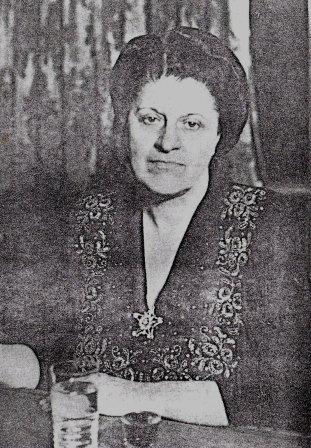Helen Cromell AKA “Dirty Helen”
By: David Heighway, Hamilton County Historian
 I’m going to finish off women’s history month with a look at Hamilton County’s most notorious female – Helen Worley Cromell AKA “Dirty Helen”. She went from being proper Cicero girl to a madam in Chicago and bar owner in Milwaukee. There has been quite a bit written about her already, in places like Paula Dunn’s column in the Noblesville Times (Article 1, Article 2) and the Milwaukee Magazine. There is also some information on Findagrave.com which tells where she is buried. She has even had a beer named after her.
I’m going to finish off women’s history month with a look at Hamilton County’s most notorious female – Helen Worley Cromell AKA “Dirty Helen”. She went from being proper Cicero girl to a madam in Chicago and bar owner in Milwaukee. There has been quite a bit written about her already, in places like Paula Dunn’s column in the Noblesville Times (Article 1, Article 2) and the Milwaukee Magazine. There is also some information on Findagrave.com which tells where she is buried. She has even had a beer named after her.
The stories are based mostly on her autobiography, “Dirty Helen”, written in 1966 with help from a magazine editor, Robert Dougherty. Copies are at the Indiana Room of the Hamilton East Public Library. The book is very lively reading, but it’s questionable as to how truthful it is. Now thanks to the Internet, we have the resources to examine some of her claims. It makes for an interesting exercise in historiography.
For example, on page 18 she tells that her mother’s family, the Josephs, owned Noblesville’s biggest brewery. I’ve written about her grandfather’s brewery. Calling it the biggest brewery in the town isn’t inaccurate. However, this was because it was the only brewery in the county. It was also closed years before Helen was even born.
According to Helen, the reason that her grandparents moved north from Kentucky after emigrating from Germany was because they objected to slavery. She said that before they left, they bought a family of slaves in Louisville and freed them in Indiana. These former slaves were the Dempseys, a family that would be a part of the Noblesville community for many years and are mentioned in many newspaper articles and records. Ancestry.com, which can be used onsite at HEPL, has many research sources for the Josephs and the Dempseys.
Her mother married Julius Worley, the Cicero telegraph operator and later station agent. The family can be found in the 1908 directory that HEPL has scanned and made available. However, Helen isn’t in it because she had married her first husband in 1903 or 1904 and moved to Cincinnati. He was Philip Cappel, a Cicero bartender.
Finding a marriage record for this is difficult since the marriage happened without her parents’ permission. She says 1903 in the book. However, another source says 1904. This other source gives some very interesting details about the marriage. Using the website Newspapers.com, which is available on the HEPL website for library card holders, there is series of articles about her divorce from her husband that tells a different story from what she says in the book.
The contemporary newspapers say that she began divorce proceedings in 1917 because her husband had threatened her and impaired her health. In the book, she says it was because of infidelity. It got interesting when the papers report that the judge gave custody of their children to her husband, saying that their lives “might have been endangered”[i]. She was accused of being a neglectful mother. As the case went on, she attempted suicide, made a dramatic effort at reconciliation in front of the judge, and finally kidnapped one of the children. The divorce became final in January of 1920 and a warrant was issued for her arrest. None of this is mentioned in the book.
Another story that she tells (on page 195) is that at one point, she was accused of having robbed a bank in South Dakota. When she was questioned by police, the only reference that she could think of was her mother’s brother, Julius X. Joseph, who became mayor of Noblesville in the late 1920’s. When he was contacted, he apparently said that while she may have been guilty of other things, she probably wouldn’t rob a bank. It would be interesting to find a contemporary account of this. As a side note, HEPL now has the docket books from the Mayor’s Court scanned and put online. Some of these are from Mayor Joseph’s term.
Lively biographies and histories like this can be frustrating to historians. While they can be fun to read and are often adapted into movies, they are full of questionable stories and events that it’s unlikely that anyone would remember decades later. Plus, her co-writer may have encouraged her to embellish things for publication. As it is, the book is a unique look at parts of Noblesville history and is still worth reading.
[i] Cincinnati Enquirer, Oct. 11, 1917, p. 5.
